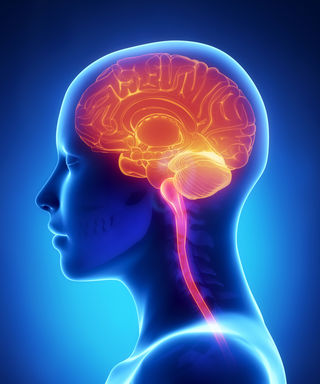Epigenetics
Epigenetic Mechanism in the Cerebellum Drives Motor Learning
An epigenetic “off” switch in the cerebellum keeps motor skill learning “on.”
Posted July 19, 2016
The cerebellum (Latin for "little brain") has long been considered the seat of muscle memory and learning new motor skills. When I was growing up, my father, who was both a neuroscientist and my tennis coach, would often say, "Chris, think about hammering and forging the muscle memory of your cerebellum with every stroke.”
The growth and pruning of neurons in the cerebellum—and throughout the brain—is required to fine-tune the motor skills needed to serve a tennis ball, play a musical instrument, master the controls of a video game, drive a stick shift, etc.
A new study from Washington University School of Medicine (WUSM) in St. Louis pinpoints the exact neural mechanisms that allow the cerebellum to learn and remember complex motor skills.
The July 2016 study, “Chromatin Remodeling Inactivates Activity Genes and Regulates Neural Coding,” appears in the journal Science.
This study was led by Azad Bonni, M.D., Ph.D., head of the Department of Neuroscience at WUSM and founder of the Bonni Lab. The researchers scrutinized specific genes in the cerebellum of mice that get turned on when the mice are physically active. In a statement, Dr. Bonni said,
"We've shown in mice that genes don't just shut off by themselves; there's an active mechanism to turn off genes after they're turned on. If that mechanism is disrupted in the brain, you see serious consequences for learning and memory.
Turning on and off genes is a fundamental property of cell biology, and this is the first epigenetic mechanism that explains how you turn off genes after they're turned on. I think we'll find that this mechanism turns off genes in many different contexts."

Epigenetics is the study of how external forces such as your environment and lifestyle choices trigger "on/off" mechanisms in genetic switchboards and gene expressions. Unlike changes to the DNA sequence of regular genetics that are hardwired into code, the changes in gene expression created by epigenetics are malleable and have a variety of outside causes.
As it turns out, the epigenetic mechanism discovered by Bonni et al. is driven by an enzyme that turns off activity-dependent transcriptions in the cerebellum and prunes dendrite growth patterns. This is key to encoding sensorimotor skills throughout the brain. The exact enzyme—known as the nucleosome remodeling and deacetylase (NuRD) complex—appears to be critical for turning off genes. Mice that lack NuRD are unable to turn off the genes after physical activity ceased.
Epigenetic Regulation in the Brain Is Key to Learning and Memory
The genes in our living cells are constantly being turned on and off via epigenetics. The failure of genes in the brain to be turned off can lead to faulty brain wiring that affects all types of learning and memory. Although the activation of genes and the growth of new neurons through neurogenesis (birth of new neurons) gets more attention than neuronal deactivation and pruning—the deactivation of genes and the pruning of neurons is equally important.
During human and animal development, neurons form billions of connections with each other. Then, in a "use-it-or-lose-it" type of neural darwinism, specific brain mechanisms prune back superfluous connections in order to "trim the fat" and streamline neural networks. Along these lines, the WUSM researchers found that certain genes are activated by physical activity which promotes the formation of neural connections called dendrites.
The smoking gun of this study appears to be that some of these dendrites must be turned off and pruned back in order to master new motor skills with fluidity. If these genes are not deactivated and all of the dendrites keep proliferating—both important connections and unimportant alike—the ability to learn new motor skills becomes impaired.
The neurons in the cerebellum of mice lacking the epigenetic enzyme NuRD were unable to prune connections, which left too many neural networks in play and created a type of chaos. These abundant connections didn't affect the mice's ability to walk on a treadmill, but it did affect their ability to learn new motor skills as adults.
In terms of peak performance and mastering a skill to the point of superfluidity—which is marked by flowing with zero friction or viscosity—I have a hypothesis that streamlining the brain connections through plasticity and pruning (as seen in the "Super 8" image to the left) is fundamental. This new research by Dr. Bonni implies that epigenetics is key to this process.
For example, adult mice lacking the enzyme could walk straight ahead on a treadmill but were unable to learn how to walk on a rotating rod that gradually sped up, a task other mice could easily master after just a few tries.
"They're walking normally, they're coordinated, but they are really profoundly impaired in learning," noted Dr. Bonni. "What's really surprising is that these deficits are due not to failure to activate genes but to failure to turn them off."
Conclusion: More Research on Epigenetics and the Cerebellum Is Needed
Moving forward, Dr. Bonni and his colleagues are conducting more research to pinpoint the exact mechanism that triggers changes in gene activity and leads to changes in brain cell activity.
"This enzyme [NuRD] is related to other enzymes that are mutated in neurodevelopmental diseases," Bonni concluded. "The ability to turn off genes turns out to have profound consequences for brain wiring and learning, and we want to figure out how." Stay tuned for upcoming research on this exciting topic!




